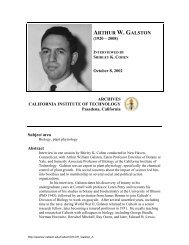Interview with Thomas A. Tombrello - Caltech Oral Histories
Interview with Thomas A. Tombrello - Caltech Oral Histories
Interview with Thomas A. Tombrello - Caltech Oral Histories
You also want an ePaper? Increase the reach of your titles
YUMPU automatically turns print PDFs into web optimized ePapers that Google loves.
<strong>Tombrello</strong>–182<br />
[Benjamin D.] Santer, who was a MacArthur [“genius” award] Fellow, an E. O. Lawrence award<br />
winner, and he’s extraordinarily good. They’ve lost some of the other players who were roughly<br />
comparable to Ben. They’ve got to rebuild that group, because it’s extremely important that they<br />
do. This is not just an issue of greens versus the not so greens. This is a national security issue.<br />
This affects how we deal <strong>with</strong> a bunch of other countries that are going to be affected by the<br />
climate. And we’re going to be affected by the climate.<br />
ASPATURIAN: It’s hard getting a lot of people to understand that.<br />
TOMBRELLO: In fact, we’re in the process of figuring out how to replace the person who is<br />
running it <strong>with</strong> another person who will have more vision. That’s hard, because this woman is a<br />
very good scientist and a very decent person. It is not her science that is being judged. It’s not<br />
her human qualities, which are superb. She’s even a good leader, if you could ignore the fact<br />
they have got to have a strategy. They’ve got to know why they’re hiring the kind of people<br />
they’re trying to hire, because these fields are going to grow.<br />
This is also true in some of the other areas. What’s the future of the weapons program?<br />
We don’t have any of the weapons directorates. But the expertise in the scientific directorates is<br />
matrix-managed—like at JPL. And so because there is roughly only one scientific directorate—<br />
except for lasers, which is separate—those people are pulled out and attached to ongoing projects<br />
as the chemistry and physics experts. It’s extremely important that they hire appropriately, not<br />
only for their own scientific needs but also for the programmatic needs of these other things.<br />
The committee can’t do the strategy. We have got to encourage the directorates or divisions to<br />
do the strategy and we comment on it. Otherwise it would be as if the <strong>Caltech</strong> visiting<br />
committees tried to determine the strategy for a division. But they certainly should be there to<br />
comment on such strategies. This approach works pretty well at <strong>Caltech</strong>. It is not working in<br />
certain pieces of this directorate. That’s the biggest challenge. How can you be strategic? Part<br />
of that is predicting the future. Not the long-term future but, you know, the five-year future.<br />
ASPATURIAN: Even that can be daunting enough.<br />
TOMBRELLO: It’s interesting. It’s extremely challenging. It is definitely in the national interest.<br />
You’ve also got to face, in the longer term, what is the real function of the national labs,<br />
http://resolver.caltech.edu/<strong>Caltech</strong>OH:OH_<strong>Tombrello</strong>_T

















